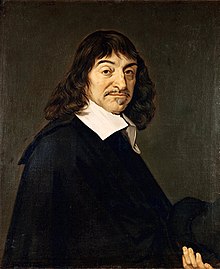Descarte
René Descartes (/deɪˈkɑːrt/, UK also /ˈdeɪkɑːrt/;French: [ʁəne dekaʁt]; Latinized: Renatus Cartesius; adjectival form: "Cartesian"; 31 March 1596 – 11 February 1650) was a French philosopher, mathematician, and scientist. Dubbed the father of modern Western philosophy, much of subsequent Western philosophy is a response to his writings, which are studied closely to this day. A native of the Kingdom of France, he spent about 20 years (1629–49) of his life in the Dutch Republic after serving for a while in the Dutch States Army of Maurice of Nassau, Prince of Orange and the Stadtholder of the United Provinces. He is generally considered one of the most notable intellectual representatives of the Dutch Golden Age.
Descartes' Meditations on First Philosophy continues to be a standard text at most university philosophy departments. Descartes' influence in mathematics is equally apparent; the Cartesian coordinate system (see below) was named after him. He is credited as the father of analytical geometry, the bridge between algebra and geometry, used in the discovery of infinitesimal calculus and analysis. Descartes was also one of the key figures in the Scientific Revolution.
...
Wikipedia

